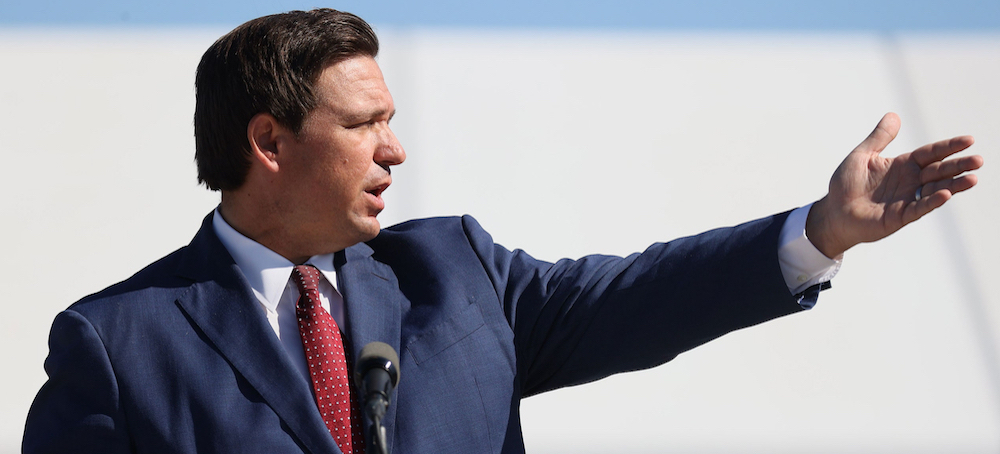Florida State Parks Whistleblower Fired After Exposing Ron Desantis’s Plans
Richard Luscombe Guardian UK Governor Ron DeSantis of Florida. (photo: Joe Raedle/Getty Images)
Governor Ron DeSantis of Florida. (photo: Joe Raedle/Getty Images) Florida State Parks Whistleblower Fired After Exposing Ron Desantis’s Plans
Richard Luscombe Guardian UK
James Gaddis tanked Florida governor’s secretive scheme to build hotels and golf courses over acres of preserved land
James Gaddis, who worked for the agency for two years as a cartographer, was terminated for “conduct unbecoming a public employee”, according to a letter he received on Saturday.
His leaking of the proposals sparked a furious backlash that united Republicans with Democrats and environmental advocates, and forced DeSantis into a humiliating climbdown last week in which he admitted the plans were “half-baked” and were “going back to the drawing board”.
Speaking with the Tampa Bay Times on Monday, Gaddis said preservation of the state parks was more important to him than his position.
“It was the absolute flagrant disregard for the critical, globally imperiled habitat in these parks,” he said. “This was going to be a complete bulldozing of all of that habitat. The secrecy was totally confusing and very frustrating. No state agency should be behaving like this.”
News of his firing came as two Democratic state representatives pressed the agency about who was involved in drawing up plans that appeared to include no-bid contracts destined for mysteriously pre-chosen developers outside the requirements of Florida law.
“Firing a cartographer who had clear concerns about the process of this plan and the lack of transparency around it is 100% retaliatory,” said Anna Eskamani, who wrote a joint letter to Shawn Hamilton, secretary of the Florida department of environmental protection (DEP) with fellow state congresswoman Angie Nixon.
“We want to not only hold the department accountable, but our motivation is to learn more about how this happened in such a secretive way. Were they using a specific legislative process? Were there conversations that were meant to be public that weren’t?
“Our intention is to prevent this from ever happening again, and that requires a better understanding of how it happened in the first place.”
The DEP did not immediately return a request for comment from the Guardian. In a statement to the Tampa Bay Times, a DEP spokesperson, Alex Kuchta, said the agency “would not comment on personnel matters”.
Kuchta was previously one of several DeSantis administration officials publicly defending or promoting the plans before the governor attempted on Wednesday to distance himself from them.
“It was not approved by me, I never saw that. It was intentionally leaked to a leftwing group to try and create a narrative,” DeSantis told reporters. Political analysts, meanwhile, called the episode “a totally self-inflicted political wound”.
In a document he said he created in his own time, and which he sent to the Times, Gaddis explained how the proposals affecting nine state parks, and featuring 350-room hotels and the paving of thousands of acres of preserved land for recreation facilities, were drawn up in barely two weeks at the beginning of the month.
“I was directed to create nine maps depicting shocking and destructive infrastructure proposals, while keeping quiet as they were pushed through an accelerated and under-the-radar public engagement process,” Gaddis wrote on a GoFundMe page he set up following his dismissal.
He said the DEP planned to hold short-notice, hour-long meetings at the nine parks simultaneously to announce the plans and minimize public comment.
Other reasons given in the letter for Gaddis’s termination were “violation of law or department rules, negligence and misconduct”, as well as providing “inaccurate” information. The letter did not specify what information Gaddis gave that was deemed to be inaccurate.
Gaddis spoke with a DEP attorney last week and admitted he was the author of the document that the Times used to break the story. He said he wrote it on his agency-issued laptop at home and worked on it alone.
“I’ve taken sole responsibility for this,” said Gaddis, a single father with an 11-year-old daughter.
By Tuesday afternoon, Gaddis’s GoFundMe appeal, entitled “an ethical whistleblower’s new start”, had surpassed $63,000, more than six times its initial target.
